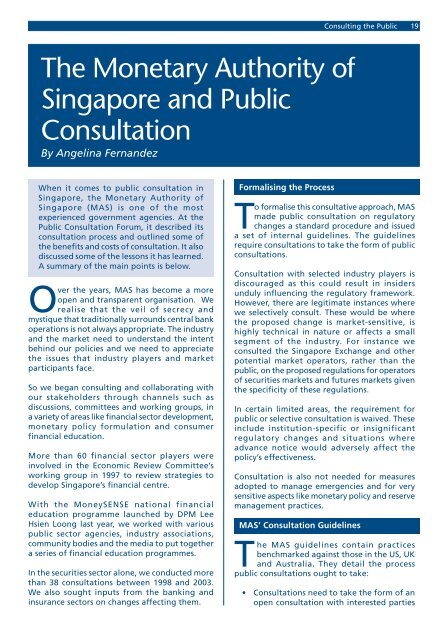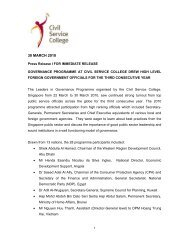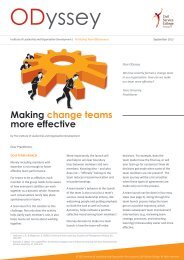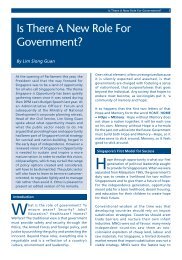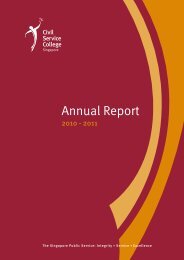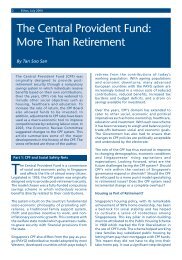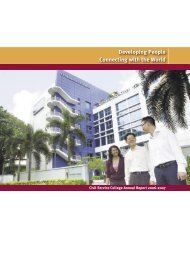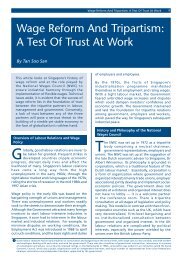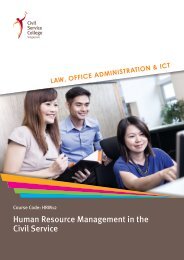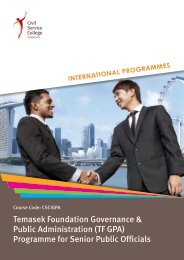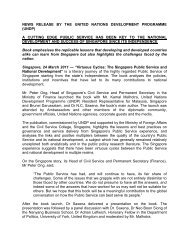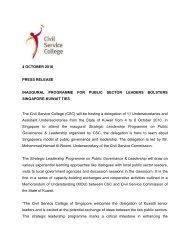The Monetary Authority of Singapore and Public Consultation
The Monetary Authority of Singapore and Public Consultation
The Monetary Authority of Singapore and Public Consultation
Create successful ePaper yourself
Turn your PDF publications into a flip-book with our unique Google optimized e-Paper software.
Consulting the <strong>Public</strong><br />
19<br />
<strong>The</strong> <strong>Monetary</strong> <strong>Authority</strong> <strong>of</strong><br />
<strong>Singapore</strong> <strong>and</strong> <strong>Public</strong><br />
<strong>Consultation</strong><br />
By Angelina Fern<strong>and</strong>ez<br />
When it comes to public consultation in<br />
<strong>Singapore</strong>, the <strong>Monetary</strong> <strong>Authority</strong> <strong>of</strong><br />
<strong>Singapore</strong> (MAS) is one <strong>of</strong> the most<br />
experienced government agencies. At the<br />
<strong>Public</strong> <strong>Consultation</strong> Forum, it described its<br />
consultation process <strong>and</strong> outlined some <strong>of</strong><br />
the benefits <strong>and</strong> costs <strong>of</strong> consultation. It also<br />
discussed some <strong>of</strong> the lessons it has learned.<br />
A summary <strong>of</strong> the main points is below.<br />
Over the years, MAS has become a more<br />
open <strong>and</strong> transparent organisation. We<br />
realise that the veil <strong>of</strong> secrecy <strong>and</strong><br />
mystique that traditionally surrounds central bank<br />
operations is not always appropriate. <strong>The</strong> industry<br />
<strong>and</strong> the market need to underst<strong>and</strong> the intent<br />
behind our policies <strong>and</strong> we need to appreciate<br />
the issues that industry players <strong>and</strong> market<br />
participants face.<br />
So we began consulting <strong>and</strong> collaborating with<br />
our stakeholders through channels such as<br />
discussions, committees <strong>and</strong> working groups, in<br />
a variety <strong>of</strong> areas like financial sector development,<br />
monetary policy formulation <strong>and</strong> consumer<br />
financial education.<br />
More than 60 financial sector players were<br />
involved in the Economic Review Committee’s<br />
working group in 1997 to review strategies to<br />
develop <strong>Singapore</strong>’s financial centre.<br />
With the MoneySENSE national financial<br />
education programme launched by DPM Lee<br />
Hsien Loong last year, we worked with various<br />
public sector agencies, industry associations,<br />
community bodies <strong>and</strong> the media to put together<br />
a series <strong>of</strong> financial education programmes.<br />
In the securities sector alone, we conducted more<br />
than 38 consultations between 1998 <strong>and</strong> 2003.<br />
We also sought inputs from the banking <strong>and</strong><br />
insurance sectors on changes affecting them.<br />
Formalising the Process<br />
To formalise this consultative approach, MAS<br />
made public consultation on regulatory<br />
changes a st<strong>and</strong>ard procedure <strong>and</strong> issued<br />
a set <strong>of</strong> internal guidelines. <strong>The</strong> guidelines<br />
require consultations to take the form <strong>of</strong> public<br />
consultations.<br />
<strong>Consultation</strong> with selected industry players is<br />
discouraged as this could result in insiders<br />
unduly influencing the regulatory framework.<br />
However, there are legitimate instances where<br />
we selectively consult. <strong>The</strong>se would be where<br />
the proposed change is market-sensitive, is<br />
highly technical in nature or affects a small<br />
segment <strong>of</strong> the industry. For instance we<br />
consulted the <strong>Singapore</strong> Exchange <strong>and</strong> other<br />
potential market operators, rather than the<br />
public, on the proposed regulations for operators<br />
<strong>of</strong> securities markets <strong>and</strong> futures markets given<br />
the specificity <strong>of</strong> these regulations.<br />
In certain limited areas, the requirement for<br />
public or selective consultation is waived. <strong>The</strong>se<br />
include institution-specific or insignificant<br />
regulatory changes <strong>and</strong> situations where<br />
advance notice would adversely affect the<br />
policy’s effectiveness.<br />
<strong>Consultation</strong> is also not needed for measures<br />
adopted to manage emergencies <strong>and</strong> for very<br />
sensitive aspects like monetary policy <strong>and</strong> reserve<br />
management practices.<br />
MAS’ <strong>Consultation</strong> Guidelines<br />
<strong>The</strong> MAS guidelines contain practices<br />
benchmarked against those in the US, UK<br />
<strong>and</strong> Australia. <strong>The</strong>y detail the process<br />
public consultations ought to take:<br />
• <strong>Consultation</strong>s need to take the form <strong>of</strong> an<br />
open consultation with interested parties
20 Ethos, July 2004<br />
invited to submit written comments. This can<br />
be complemented by other consultation<br />
modes like meeting or surveying affected<br />
parties, forming committees with<br />
representation from all affected parties, <strong>and</strong><br />
organising public meetings.<br />
• Each consultation should be accompanied by<br />
a consultation paper published on the MAS<br />
website (www.mas.gov.sg).<br />
• To facilitate considered <strong>and</strong> meaningful<br />
responses, a consultation paper should<br />
provide a concise rationale, explanation <strong>and</strong><br />
analysis <strong>of</strong> the proposed measures.<br />
• It should contain a summary <strong>of</strong> proposals or<br />
highlight the specific issues on which MAS<br />
would like comments. Questions on specific<br />
issues provide focus <strong>and</strong> prompt the reader<br />
to react.<br />
• <strong>The</strong> consultation period should be at least<br />
30 days to give interested parties sufficient<br />
time to respond. For substantial changes, the<br />
period should be longer <strong>and</strong> the consultation<br />
should be publicised through a press release.<br />
• A consultation paper must list a snail mail<br />
<strong>and</strong> email address for submissions, as well<br />
as a contact person who can respond to<br />
questions.<br />
• We need to publish on the MAS website a<br />
brief summary <strong>of</strong> submissions <strong>and</strong> our<br />
responses at the time when the changes are<br />
finalised <strong>and</strong> announced. This is to assure<br />
respondents that their submissions have<br />
been read <strong>and</strong> considered.<br />
• To enhance transparency <strong>and</strong> ensure that<br />
public submissions are meaningful <strong>and</strong><br />
responsible, the consultation papers state<br />
that individual submissions may be made<br />
public unless confidentiality is expressly<br />
requested.<br />
On One H<strong>and</strong>...<br />
<strong>Consultation</strong> improves the policy-making process<br />
in several ways.<br />
First, we can tap on market practitioners’<br />
knowledge <strong>and</strong> underst<strong>and</strong>ing <strong>of</strong> the market to<br />
validate <strong>and</strong>, where appropriate, refine our<br />
policies. For instance, in our recent consultation<br />
on the Securities <strong>and</strong> Futures Act amendments,<br />
we wanted to allow collective investment<br />
schemes, such as unit trusts, to be marketed to<br />
institutional investors before the scheme’s<br />
prospectus is registered. Practitioners commented<br />
we need not differentiate between institutional<br />
investors <strong>and</strong> sophisticated investors 1 . We agreed<br />
with this <strong>and</strong> will permit pre-marketing to<br />
both institutional investors <strong>and</strong> sophisticated<br />
individuals.<br />
Market players can also help us identify <strong>and</strong><br />
deal with implementation issues in advance. For<br />
instance, they informed us that our requirement<br />
for banks to divest their non-financial assets<br />
would have significant tax implications. This<br />
allowed us to work with the Inl<strong>and</strong> Revenue<br />
<strong>Authority</strong> <strong>of</strong> <strong>Singapore</strong> on a one-<strong>of</strong>f tax concession<br />
to facilitate the divestments.<br />
<strong>Consultation</strong> also provides an avenue to explain<br />
<strong>and</strong> garner support for our policies. We had<br />
extensive discussions with the local banks<br />
before introducing the banking liberalisation<br />
programme in 1999. We explained the programme’s<br />
rationale, <strong>and</strong> assured the banks that we would<br />
calibrate the pace <strong>and</strong> extent <strong>of</strong> liberalisation to<br />
encourage competition while allowing them to<br />
strengthen <strong>and</strong> reposition themselves.<br />
Making proposed policy changes known<br />
beforeh<strong>and</strong> helps provide greater certainty<br />
<strong>and</strong> enables the affected parties to prepare<br />
for the new policies. Institutions need time to<br />
establish processes or reallocate resources for<br />
new regulatory changes. <strong>Consultation</strong> provides<br />
this ‘heads up’ which is clearly preferable to<br />
introducing new requirements to unwitting<br />
parties who may not be prepared to comply.<br />
A more consultative <strong>and</strong> transparent approach to<br />
policy formulation is consistent with <strong>Singapore</strong>’s<br />
stature as an international financial centre. In<br />
the recent IMF-World Bank Financial Sector<br />
Assessment Programme, <strong>Singapore</strong> was evaluated<br />
as having observed the IMF Code <strong>of</strong> Good Practices<br />
on Transparency for our public consultation process.<br />
1 A “sophisticated investor” is one who has sufficient knowledge <strong>and</strong> experience with investing to be able to evaluate the merits <strong>of</strong> an investment.<br />
In <strong>Singapore</strong>, a sophisticated investor would include an individual with total net personal assets exceeding S$2 million or an annual income <strong>of</strong><br />
at least S$300,000.
Consulting the <strong>Public</strong><br />
21<br />
On the Other H<strong>and</strong>. . .<br />
Greater consultation <strong>and</strong> transparency are not<br />
without trade-<strong>of</strong>fs for MAS <strong>and</strong> our stakeholders.<br />
It lengthens the policy-making process. MAS<br />
departments need to factor in time for consultation<br />
when planning policy changes.<br />
Greater consultation also requires more resources<br />
from MAS <strong>and</strong> industry. Our staff need to devote<br />
more time to prepare consultation papers, as<br />
well as to analyse the feedback received. Likewise,<br />
industry players <strong>and</strong> associations have to devote<br />
resources to study the implications <strong>of</strong> the<br />
proposed changes.<br />
<strong>Consultation</strong> does not ensure that all parties will<br />
agree with the outcome. It provides us with more<br />
complete information to make a decision. Having<br />
arrived at that decision, we then need to indicate<br />
how we have dealt with the comments received<br />
<strong>and</strong> acknowledge those who have taken the time<br />
to provide feedback. Our consultation guidelines<br />
require a summary <strong>of</strong> responses to be published<br />
on the MAS website.<br />
Managing Expectations<br />
Giving due consideration to managing<br />
public expectations <strong>and</strong> reactions can make<br />
or break a policy review.<br />
So rather than spring a surprise on the<br />
market, we have found it helpful to alert<br />
key stakeholders on forthcoming public<br />
consultations. In some cases, we conduct<br />
briefings for the relevant parties so that they<br />
can underst<strong>and</strong> our proposals better.<br />
Sometimes, we discuss more preliminary<br />
ideas with selected groups to gauge market<br />
reaction before releasing the consultation<br />
papers. We did this when we were revising<br />
banks’ lending limits to the property sector.<br />
<strong>The</strong> media plays a role too. By sharing our<br />
perspectives <strong>and</strong> giving them information<br />
about the subject under consultation, they<br />
will be in a better position to report the<br />
proposed changes in a balanced manner.<br />
Overall, public consultation has been beneficial<br />
both to MAS <strong>and</strong> the financial industry <strong>and</strong> is an<br />
approach we will continue to enhance.


